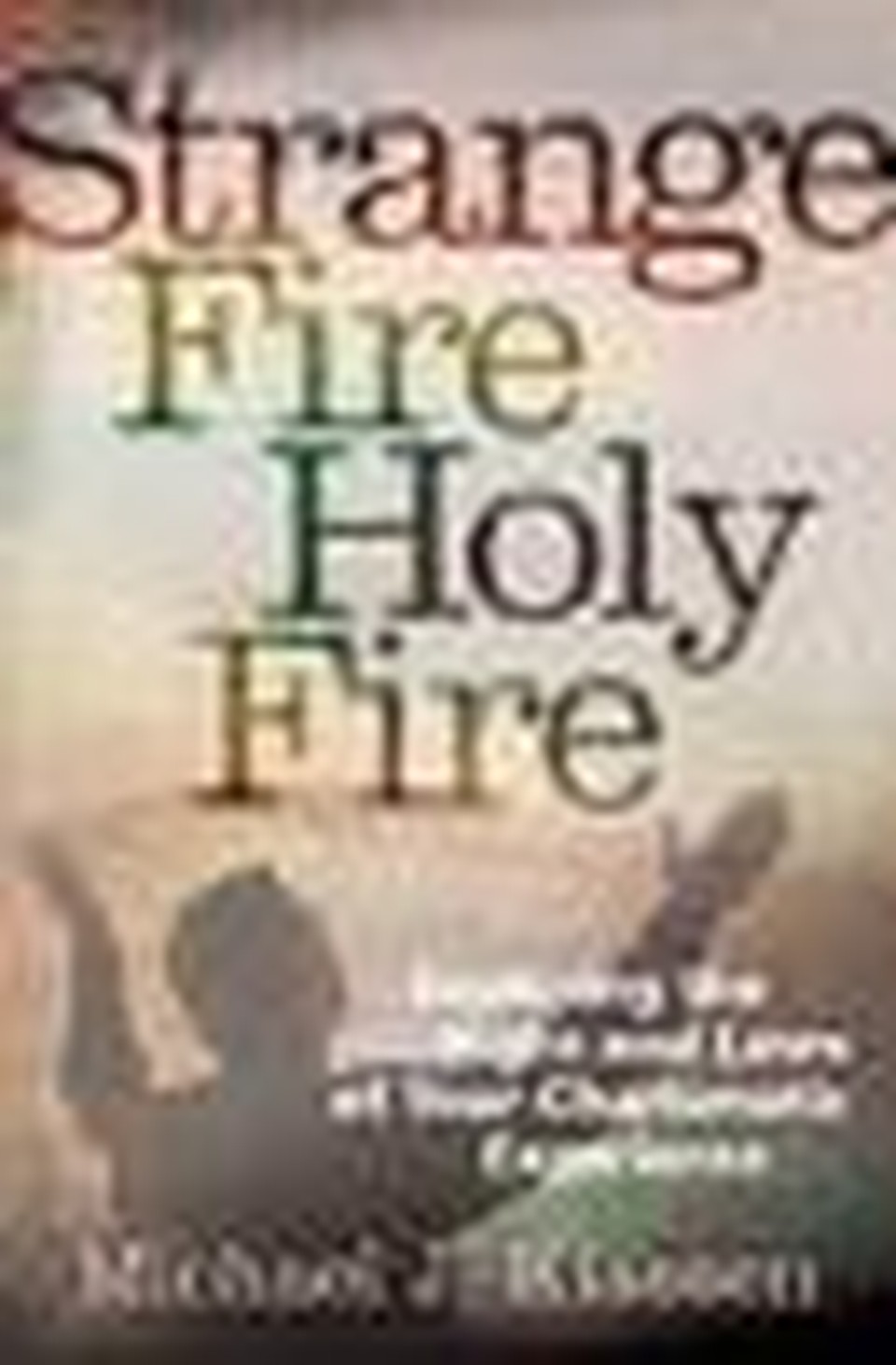Strange Fire, Holy Fire

Editor’s Note: The following is an excerpt from Strange Fire, Holy Fire: Exploring the Highs and Lows of Your Charismatic Experience by Michael Klassen (Bethany House).
Introduction
A Critic and an Apologist
"So ... what did you think of your experience as a charismatic?"
Every time I'm asked that question I cringe. How do I respond to something that stirs up strong, ambivalent emotions of both affection and revulsion? How do I respond to the feeling of buying into a bunch of hooey, yet knowing that elements of truth were woven into the fabric of my experience?
Reflecting on my participation in the charismatic movement unleashes a flood of often contradictory feelings. Pain. Embarrassment. Gratitude.
It's kind of like the way I got along with my younger sister, Lisa, when we were kids. We could fight like cats and dogs and say really mean things to each other. But when a boy at school started picking on her (she was seven and I was fourteen), I couldn't wait to meet him after school:
"If you so much as lay a finger on my little sister, I'll throw you in a trash can and roll you down the street," I scolded the boy in a stern voice. Obviously, the hapless kid was no match for an eighth-grader.
Even today, Lisa and I can spend an evening criticizing our common experience in the charismatic movement. And we have. But if an "outsider" so much as lays a finger on our experience, we're both ready to throw the person in a trash can and roll him down the street. Of course, I mean that in a figurative sense, but in a literal sense, you'd have a catfight on your hands.
Lisa and I are admittedly critics and apologists. How can that be?
After leaving the independent charismatic movement, I served as a pastor in a fairly stodgy denomination. Officials loved to parade me around as the wayward Christian gone good. I was presented before groups of impressionable young people to warn them of the evils of the independent charismatic movement. And although I agreed with everything I said, something inside told me I was a traitor. I had left the movement, yet I still believed—deeply—in the fundamental truths that undergird it.
Like a pendulum, I started at the extreme end and allowed the gravitational pull of hurts, disappointments, frustrations, and more embarrassment than I care to admit to propel me to the other side. Yet the opposite end offered me as little rest as my starting point. Pendulums tend to do that. Criticism, negativity, and its bitter offspring, cynicism, never satisfy. So the pendulum returns to its starting point only to offer more disappointment, frustration, and embarrassment.
But eventually the pendulum must come to rest. That's what this book is about: finding a resting place within the charismatic movement.
A Word About Recovering Charismatics
Periodically as you read, you will come across the term recovering charismatic. If you're a charismatic on the "upswing" of the pendulum, or simply a Holy Spirit seeker, you may be wondering, What does he mean by a recovering charismatic?
While recovery programs are valid and quite helpful, this isn't a study on twelve-step programs. However, I'd like to borrow a few ideas from the recovery movement that pertain to this book:
1. The recovery movement is rooted in the acknowledgment of brokenness.
A woman can't overcome her addiction to Twizzlers until she acknowledges that every day she craves the twisty, shiny, red licorice. The same applies to alcohol, sex, or reruns of SpongeBob Squarepants (one of my vices).
A recovering charismatic admits that a line has been crossed, a wound has been inflicted, a conscience has been offended, or a bunch of hooey has been believed. Not only is this so, but now you regret it. Deeply.
Anger characterizes my initial feelings when I reflect on my experience. But since anger is a secondary emotion, something lies far deeper. What is it? I'm still figuring it out, but I think it's pain. The pain of doing some pretty wacky things in the name of the Holy Spirit. The pain of buying into a brand of Christianity that is distinctly Western. The pain of realizing how fallible I really am.
2. The vices that drive us into recovery are inherently good.
Everything is created by God to be enjoyed within the context of his divine plan. The apostle Paul wrote, "All things are yours, whether Paul or Apollos or Cephas or the world or life or death or the present or the future—all are yours, and you are of Christ, and Christ is of God" (1 Corinthians 3:21–23).
Did you notice that word all? Do you know what all means in the Greek? All means "all." Alcohol isn't inherently evil and neither is sex (whew!). But they can place us in a position where we allow them to master us or take advantage of us and as a result, inflict pain.
The charismatic movement has proven itself to be inherently good: lives changed, people healed, the church empowered in new ways—undoubtedly a sovereign move of God. But somewhere along the way, miraculous gifts and the emphasis on power all too often became the main thing.
Many carnivals and amusement parks incorporate a booth where an artist draws caricatures of people who pass by. The drawing exaggerates a person's distinctive features, which may include a big nose (think Jimmy Durante), a prominent chin (Jay Leno), or poofy hair (Don King).
In a caricature, the peripheral thing becomes the main thing. The "charismatic" gifts, especially speaking in tongues, become the measure of spirituality. And where do caricatures belong? At carnivals and amusement parks. I fear at times our churches resemble those places, as well.
3. Recovery is more a journey than a destination.
People in recovery acknowledge that their journeys never come to an end. Because of this, we never see ourselves as completely "over" our experiences.
I grew up a charismatic, and I'll always carry that experience with me. At times those feelings of affection and gratitude degenerate into revulsion, pain, and embarrassment.
In my thirty-plus years of involvement in the charismatic movement, I've met people who wanted very badly to speak in tongues, but for some reason, they couldn't or didn't. Others struggled with chronic illnesses and pleaded with God to be healed, but he didn't answer their requests—at least not in this life. These folks remained in their churches, but were relegated to a lower caste—fit for those who weren't spiritual enough or didn't have enough faith.
My malady? I won't let you in on it just yet, but you'll probably figure it out as you read on. My point is this: I don't want to stay in the revulsion, pain, and embarrassment. And if you're a recovering charismatic, or on the verge of becoming one, you probably don't either. We want to get better. We want healing and wholeness.
We're all in different stages of recovery from our shortcomings and flesh (affectionately called our sinful nature), but hopefully this book will give you an opportunity to move on.
Your experience may be similar to mine. You may have been severely hurt by people in this movement, or its theology, and now you're ready to find meaning in it.
Then again, you may be that window shopper who simply wants to make heads or tails of this strange, intriguing yet alluring movement. (You may even be attending an independent charismatic church, and you're trying to get a sense of what's legitimate and what's not.) (I use parentheses because using them is like talking in a whisper ... so no one at church will hear!)
Regardless of your reason for choosing this book, I invite you to join me as we journey on this path together. At the risk of overspiritualizing, I'd like you to see this as a pilgrimage. A journey of spiritual significance. On a roller coaster.
Along the way we'll stop at the highs and lows of various charismatic signposts: tongues, healing, television evangelists, authority, "the Word." Hopefully our time together will give you an opportunity to reflect and to find healing and a redemptive sense of significance from your experience.
If you attend a charismatic church, I hope this book helps you separate the wheat from the chaff so you can live more authentically in the power of the Holy Spirit—and still remain in your church.
If you're a Holy Spirit seeker, I hope this book makes you thirstier for more of his work in your life. Paul encouraged us to "earnestly desire the spiritual gifts" (1 Corinthians 14:1 esv). The spiritual gifts practiced in charismatic churches—including the controversial gifts—are legitimate and important. Unfortunately, they can be abused and confused with hype, flesh, and misunderstanding. May this book help you navigate your way through the ambiguity.
Strange Fire, Holy Fire: Exploring the Highs and Lows of Your Charismatic Experience
Copyright © 2008 by Michael Klassen
ISBN 9780764205491
Published by Bethany House Publishing, a division of Baker Publishing Group
PO Box 6287 Grand Rapids MI 49516-6287
Used by permission. All rights reserved. No part of this publication may be reproduced, stored in a retrieval system or transmitted in any form by any means, electronic, mechanical, photocopy, recording or otherwise, without the prior permission of the publisher, except as provided for by USA copyright law.
Originally published March 05, 2009.







